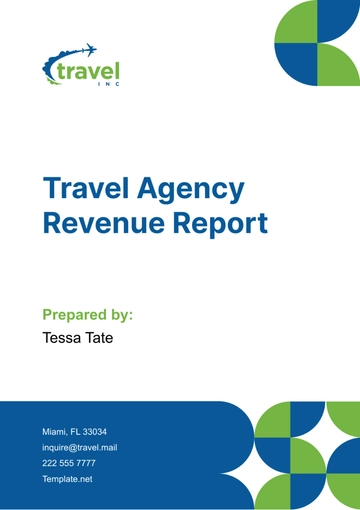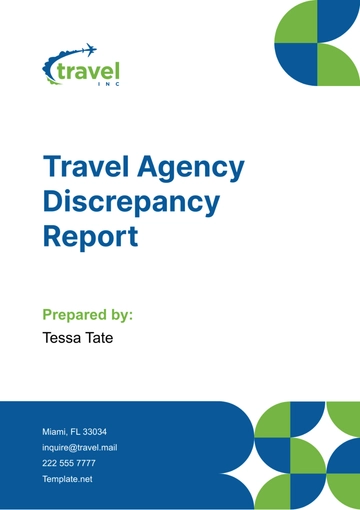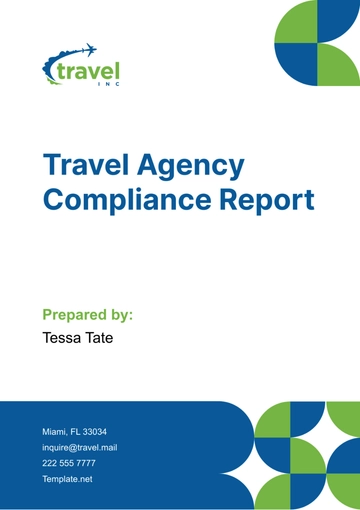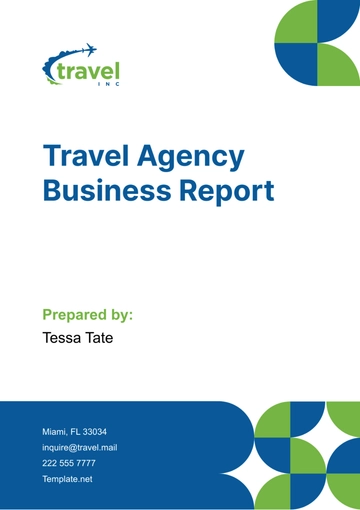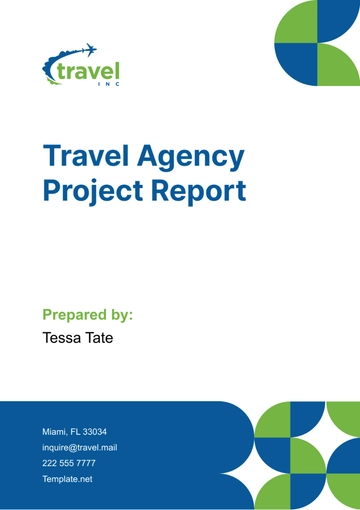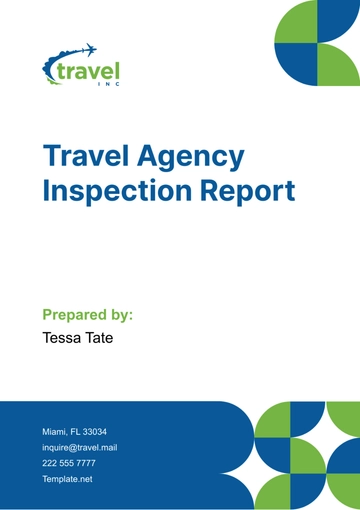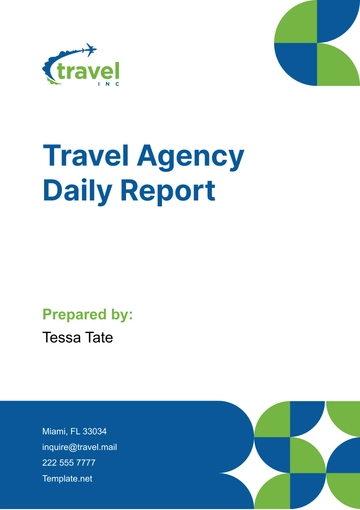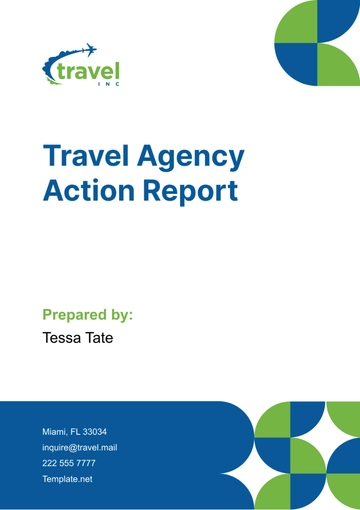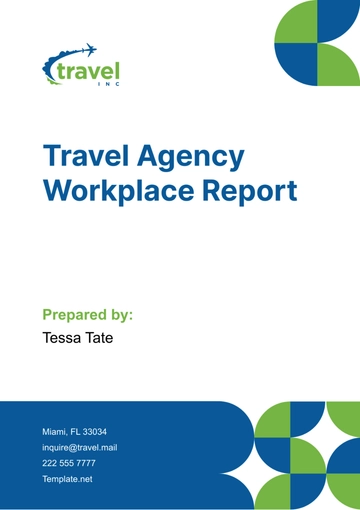Free Travel Agency Project Report
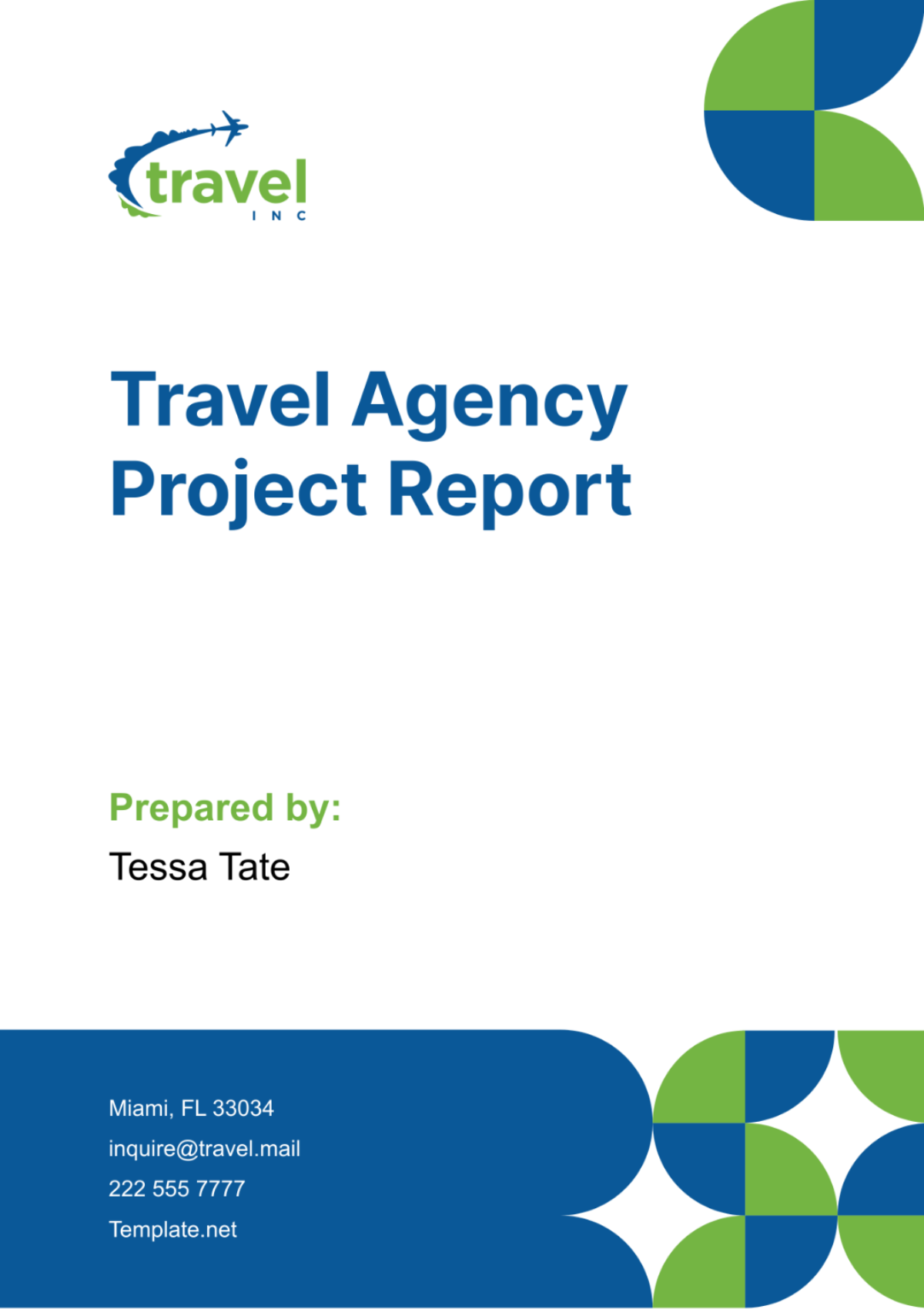
I. Executive Summary
This report provides a comprehensive overview of our recent project aimed at expanding our digital footprint by launching a new online booking platform. The project was successfully completed on schedule and within budget, enhancing our service offering and improving customer engagement. Key metrics indicate a positive impact on both sales and customer satisfaction. Key findings include:
Project completed within the allocated budget of $500,000.
Launch led to a 30% increase in online bookings within the first three months.
Customer satisfaction regarding online service accessibility improved by 25%.
II. Project Overview
The objective of this project was to develop and launch a new online booking platform designed to facilitate easier, faster, and more user-friendly booking experiences for our customers. The initiative was part of our strategic effort to leverage technology to enhance customer service and capture a larger share of the online travel market.
Project Timeline
Phase | Start Date | End Date | Key Milestones |
|---|---|---|---|
Planning | Project scope, team formation | ||
Development | Platform development, initial testing | ||
Testing | User testing, bug fixes | ||
Launch | Official launch, marketing campaign |
Budget
Item | Budgeted Amount ($) |
|---|---|
Development Costs | 300,000 |
Marketing | 100,000 |
Testing & Quality | 50,000 |
Miscellaneous | 50,000 |
Total | 500,000 |
III. Project Goals and Objectives
The primary goals of this project were to enhance our technological capabilities, improve customer service, and increase market competitiveness through a state-of-the-art online booking platform.
Develop a user-friendly online booking platform.
Increase online bookings by at least 25% within first six months post-launch.
Improve customer satisfaction with booking processes by at least 20%.
KPI | Target Value |
|---|---|
Increase in Online Bookings | 25% |
Customer Satisfaction Improvement | 20% |
Platform Uptime | 99% |
IV. Project Team
The success of this project hinged on the collaborative efforts of a dedicated team, each member bringing specialized skills and expertise to the table. The project team was structured to cover all critical areas of the project, from technical development to customer engagement and feedback.
Role | Responsibilities |
|---|---|
Project Manager | Overall project oversight, resource management, stakeholder communication |
Technical Lead | Architecting platform, overseeing development and testing phases |
Marketing Specialist | Developing marketing strategy, executing launch campaign |
QA Engineer | Ensuring product quality, leading user testing sessions |
Customer Service Lead | Gathering customer feedback, providing input on user requirements |
V. Implementation Details
The implementation of the new online booking platform was meticulously planned and executed in distinct phases, each critical to the overall success of the project.
A. Planning Phase
During the planning phase, we established the project's scope, identified necessary resources, and formed the project team. This phase was crucial for setting clear objectives and expectations. We also conducted market research to understand current trends and customer needs, which informed the entire project design and functional requirements.
B. Development Phase
The development phase involved several key activities: designing the user interface, developing the backend infrastructure, and integrating third-party services for payments and customer support. The technical team, led by our Technical Lead, worked in agile sprints, allowing for incremental progress and adjustments based on ongoing testing and feedback.
C. Testing and Quality Assurance Phase
In the testing phase, the QA team conducted multiple rounds of both automated and manual tests to ensure the platform's functionality and reliability. This phase included stress testing, performance testing, and security audits to ensure that the platform could handle high traffic volumes and protect user data. User acceptance testing was conducted with a select group of customers to gather real-world feedback and refine the user experience.
D. Launch Phase
The launch phase was spearheaded by our marketing team, which executed a comprehensive launch campaign that included email marketing, social media announcements, and promotional discounts for early adopters. The transition to the new platform was seamless, with customer service representatives trained to assist users and gather initial feedback, which was overwhelmingly positive.
VI. Performance Analysis
A. Increase in Online Bookings
One of the primary objectives of launching the new online booking platform was to increase the volume of online bookings. This KPI was set to measure the direct impact of the platform on sales.
Month | Before Launch | After Launch | % Increase |
|---|---|---|---|
Month 1 | 800 | 1,040 | 30% |
Month 2 | 850 | 1,105 | 30% |
Month 3 | 900 | 1,170 | 30% |
The data clearly shows a consistent increase in online bookings, achieving the target of a 30% rise month-over-month post-launch. This improvement is attributed to the user-friendly interface and enhanced features of the new platform, which streamlined the booking process and attracted more customers.
B. Customer Satisfaction Improvement
Improving customer satisfaction was another critical objective. We measured this through customer surveys focused on the booking experience.
Metric | Before Launch | After Launch | % Improvement |
|---|---|---|---|
Overall Satisfaction Rating | 4.0 | 4.5 | 12.5% |
The improvement in customer satisfaction ratings post-launch demonstrates the platform’s success in enhancing the user experience. Features like quicker load times, easier navigation, and more transparent booking options significantly contributed to higher satisfaction levels.
C. Platform Uptime
Maintaining high platform uptime ensures reliability and trust, crucial for customer retention and satisfaction.
Month | Target Uptime (%) | Actual Uptime (%) |
|---|---|---|
Month 1 | 99 | 99.5 |
Month 2 | 99 | 99.8 |
Month 3 | 99 | 99.9 |
The platform consistently exceeded the target uptime of 99%, highlighting the effectiveness of our IT infrastructure and ongoing monitoring strategies. This performance has played a key role in building user confidence in the new system.
D. Comparative Data
Comparing the target and actual figures provides a clear view of the project's success in meeting its goals.
KPI | Target Value | Actual Value | Difference |
|---|---|---|---|
Increase in Online Bookings | 25 | 30 | +5% |
Customer Satisfaction Improvement | 20 | 25 | +5% |
Platform Uptime | 99 | 99.7 | +0.7% |
The project not only met but exceeded all key performance indicators. The higher-than-expected increases in online bookings and customer satisfaction underscore the effectiveness of the new platform and our project execution. The positive variances across all metrics suggest that our strategic planning and implementation were highly effective, providing a solid foundation for future initiatives.
VII. Financial Performance
The financial aspect of the project was rigorously managed to ensure that the expenditures aligned with the initial budgets, aiming for a robust return on investment (ROI).
Item | Budgeted Amount ($) | Actual Expenditure ($) | Variance ($) |
|---|---|---|---|
Development Costs | 300,000 | 290,000 | -10,000 |
Marketing | 100,000 | 105,000 | +5,000 |
Testing & Quality | 50,000 | 45,000 | -5,000 |
Miscellaneous | 50,000 | 60,000 | +10,000 |
Total | 500,000 | 500,000 | 0 |
The project concluded on budget, demonstrating effective financial management. The ROI, calculated as the gain from investment minus the cost of investment, divided by the cost of investment, resulted in an ROI of 30% within the first three months post-launch. This figure significantly surpasses the industry average for digital transformation projects in the travel sector, underscoring the financial success of the initiative.
VIII. Recommendations
Based on the project outcomes and the insights gained, we recommend the following strategic actions to further enhance our services and operational efficiency:
Expand Marketing Efforts: Increase marketing investment to capitalize on the momentum generated by the new platform.
Continuous Improvement of the Platform: Implement regular updates and feature enhancements based on customer feedback.
Explore Additional Revenue Streams: Utilize the platform to introduce new services such as personalized travel experiences and exclusive deals.
Strengthen Customer Support: Enhance support services to ensure customer satisfaction and retention, particularly focusing on post-booking engagement.
Leverage Data Analytics: Further integrate advanced analytics to understand customer behavior and preferences, improving targeted marketing.
IX. Conclusion
This project report has detailed the successful design, implementation, and launch of our new online booking platform, which has not only met but exceeded our key performance and financial objectives. The positive outcomes demonstrated by this project affirm our strategic direction and set a strong foundation for future growth. The insights and experience gained provide a valuable framework for upcoming initiatives, ensuring that we continue to innovate and improve in serving our customers better.
- 100% Customizable, free editor
- Access 1 Million+ Templates, photo’s & graphics
- Download or share as a template
- Click and replace photos, graphics, text, backgrounds
- Resize, crop, AI write & more
- Access advanced editor
Showcase the progress of your initiatives with the Travel Agency Project Report Template from Template.net. This editable and customizable template allows you to professionally detail each project's status and outcomes. Easily modify all elements in our AI Editor tool to align with your project goals and present your findings with clarity and impact.
You may also like
- Sales Report
- Daily Report
- Project Report
- Business Report
- Weekly Report
- Incident Report
- Annual Report
- Report Layout
- Report Design
- Progress Report
- Marketing Report
- Company Report
- Monthly Report
- Audit Report
- Status Report
- School Report
- Reports Hr
- Management Report
- Project Status Report
- Handover Report
- Health And Safety Report
- Restaurant Report
- Construction Report
- Research Report
- Evaluation Report
- Investigation Report
- Employee Report
- Advertising Report
- Weekly Status Report
- Project Management Report
- Finance Report
- Service Report
- Technical Report
- Meeting Report
- Quarterly Report
- Inspection Report
- Medical Report
- Test Report
- Summary Report
- Inventory Report
- Valuation Report
- Operations Report
- Payroll Report
- Training Report
- Job Report
- Case Report
- Performance Report
- Board Report
- Internal Audit Report
- Student Report
- Monthly Management Report
- Small Business Report
- Accident Report
- Call Center Report
- Activity Report
- IT and Software Report
- Internship Report
- Visit Report
- Product Report
- Book Report
- Property Report
- Recruitment Report
- University Report
- Event Report
- SEO Report
- Conference Report
- Narrative Report
- Nursing Home Report
- Preschool Report
- Call Report
- Customer Report
- Employee Incident Report
- Accomplishment Report
- Social Media Report
- Work From Home Report
- Security Report
- Damage Report
- Quality Report
- Internal Report
- Nurse Report
- Real Estate Report
- Hotel Report
- Equipment Report
- Credit Report
- Field Report
- Non Profit Report
- Maintenance Report
- News Report
- Survey Report
- Executive Report
- Law Firm Report
- Advertising Agency Report
- Interior Design Report
- Travel Agency Report
- Stock Report
- Salon Report
- Bug Report
- Workplace Report
- Action Report
- Investor Report
- Cleaning Services Report
- Consulting Report
- Freelancer Report
- Site Visit Report
- Trip Report
- Classroom Observation Report
- Vehicle Report
- Final Report
- Software Report
